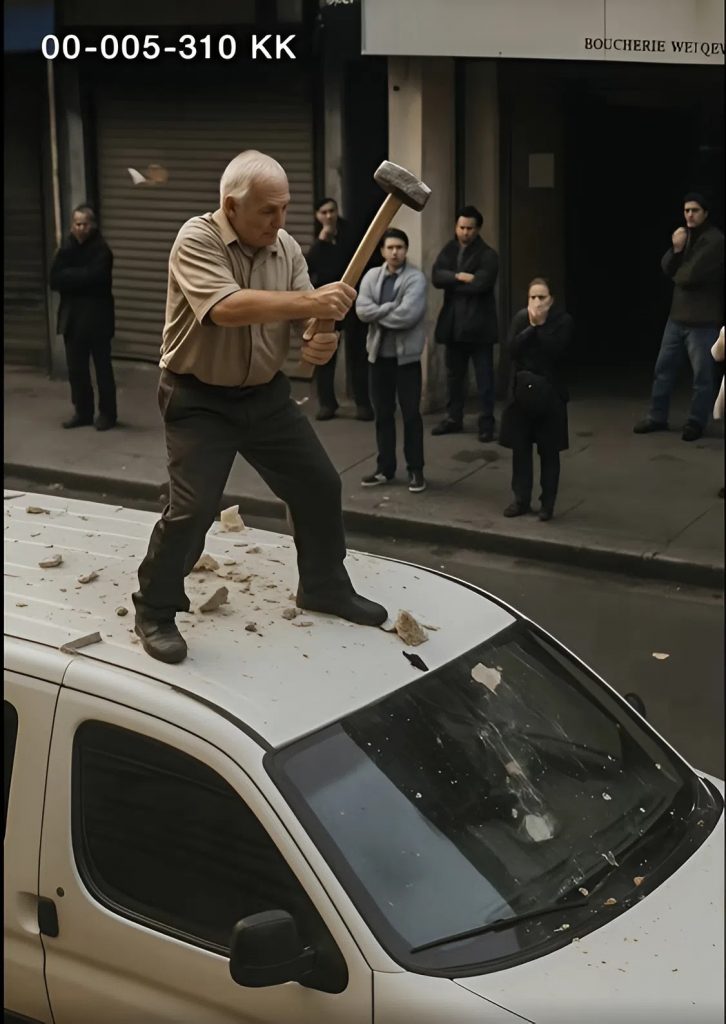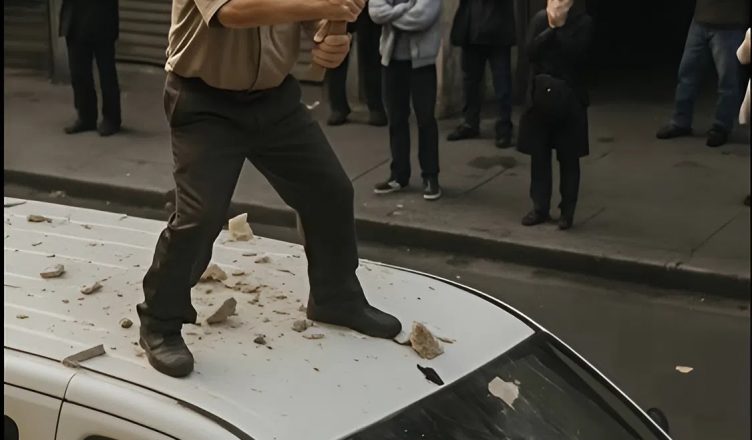On a narrow, dimly lit street in the old quarter, the heavy evening air was suddenly shattered by a strange, resonant noise — a deep, metallic thud, as if someone was striking a thick steel plate with all their strength. The sound echoed between the aging buildings, startling passersby.
When people turned to look, they saw a scene that seemed almost unreal. On the roof of a battered white van stood an older man with disheveled gray hair, gripping a massive sledgehammer in both hands. With each powerful swing, the metal beneath his feet caved in and cracked, sending paint chips and rusty fragments flying to the ground.
The van’s roof was already deeply dented, and the windshield — once intact — was now spiderwebbed with cracks. One final blow shattered it completely, sending glittering shards scattering across the asphalt. It was clear this man wasn’t just damaging a vehicle — he was pouring every ounce of pain and rage into those strikes.
He shouted something between swings, but his voice was hoarse and broken. Some phrases sounded like pleas, others like curses. No one dared get close. A few onlookers filmed the scene on their phones, while others hurriedly called the police.
Minutes later, the wail of sirens cut through the tension. A patrol car screeched to a halt, and two officers jumped out. They approached cautiously, calling to the man, but he seemed deaf to their words. Only when one officer grabbed his arm did he pause.
The sledgehammer slipped from his hands and hit the ground with a dull thud. As if all the strength had drained from him, the man sat down heavily on the curb, buried his face in his hands, and began to sob quietly. He didn’t resist, didn’t try to flee — just sat there, trembling.

The officers crouched beside him, asking questions: Why was he destroying the van? Whose was it? Had anyone been hurt? Slowly, without looking up, the man began to speak.
His voice shook, but each word carried the weight of grief. The van, he said, was his own — and for the last two years, it had been his only home. Once, he’d had a family, an apartment, a steady job. But tragedy after tragedy had stripped it all away: his wife’s illness, her death, the loss of his job. The van became his shelter, his means to earn small amounts of money, and the place where he kept everything he had left.
A few nights ago, the engine failed. The repairs would cost more than he could possibly afford. But what broke him completely happened just the night before — when a group of teenagers broke into the van. They trashed the inside, stole the last possessions of his late wife: her old photo album and the dress she’d worn on their anniversary.
When he opened the door that morning and saw the emptiness where those things had been, something inside him snapped. The van was no longer a home — just a hollow shell of memories too painful to bear. And so, he decided to destroy it himself, blow by blow, until nothing was left to remind him of what he had lost.
The officers listened in silence. There was no judgment in their eyes — only quiet compassion. One of them even turned away for a moment, as if hiding his own reaction.
The man sat hunched over, staring at the cracked asphalt. And in a strange way, it seemed that with each dent in the van’s roof, he had shattered another chain binding him to his past. Perhaps, in destroying the van, he had taken the first step toward building something new — without a sledgehammer in his hands, but with the faint hope that somewhere ahead, there might still be light.
